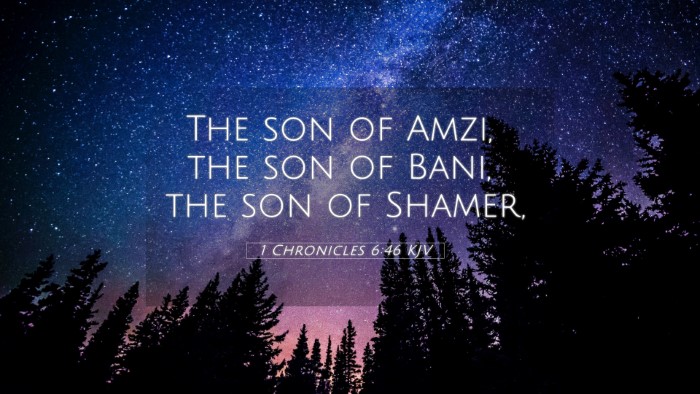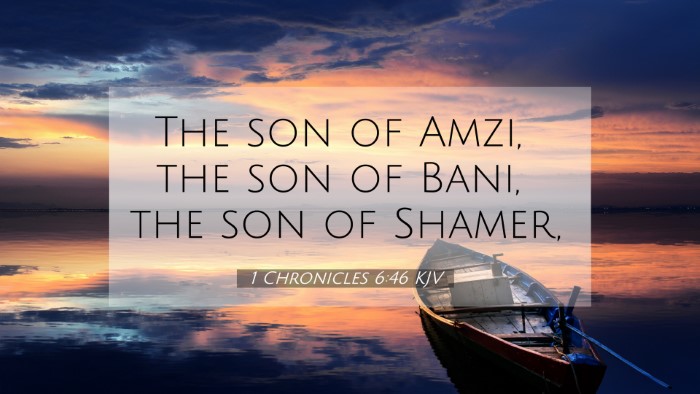Old Testament
Genesis Exodus Leviticus Numbers Deuteronomy Joshua Judges Ruth 1 Samuel 2 Samuel 1 Kings 2 Kings 1 Chronicles 2 Chronicles Ezra Nehemiah Esther Job Psalms Proverbs Ecclesiastes Song of Solomon Isaiah Jeremiah Lamentations Ezekiel Daniel Hosea Joel Amos Obadiah Jonah Micah Nahum Habakkuk Zephaniah Haggai Zechariah MalachiChapter
1 Chronicles 1 1 Chronicles 2 1 Chronicles 3 1 Chronicles 4 1 Chronicles 5 1 Chronicles 6 1 Chronicles 7 1 Chronicles 8 1 Chronicles 9 1 Chronicles 10 1 Chronicles 11 1 Chronicles 12 1 Chronicles 13 1 Chronicles 14 1 Chronicles 15 1 Chronicles 16 1 Chronicles 17 1 Chronicles 18 1 Chronicles 19 1 Chronicles 20 1 Chronicles 21 1 Chronicles 22 1 Chronicles 23 1 Chronicles 24 1 Chronicles 25 1 Chronicles 26 1 Chronicles 27 1 Chronicles 28 1 Chronicles 29Verse
1 Chronicles 6:1 1 Chronicles 6:2 1 Chronicles 6:3 1 Chronicles 6:4 1 Chronicles 6:5 1 Chronicles 6:6 1 Chronicles 6:7 1 Chronicles 6:8 1 Chronicles 6:9 1 Chronicles 6:10 1 Chronicles 6:11 1 Chronicles 6:12 1 Chronicles 6:13 1 Chronicles 6:14 1 Chronicles 6:15 1 Chronicles 6:16 1 Chronicles 6:17 1 Chronicles 6:18 1 Chronicles 6:19 1 Chronicles 6:20 1 Chronicles 6:21 1 Chronicles 6:22 1 Chronicles 6:23 1 Chronicles 6:24 1 Chronicles 6:25 1 Chronicles 6:26 1 Chronicles 6:27 1 Chronicles 6:28 1 Chronicles 6:29 1 Chronicles 6:30 1 Chronicles 6:31 1 Chronicles 6:32 1 Chronicles 6:33 1 Chronicles 6:34 1 Chronicles 6:35 1 Chronicles 6:36 1 Chronicles 6:37 1 Chronicles 6:38 1 Chronicles 6:39 1 Chronicles 6:40 1 Chronicles 6:41 1 Chronicles 6:42 1 Chronicles 6:43 1 Chronicles 6:44 1 Chronicles 6:45 1 Chronicles 6:46 1 Chronicles 6:47 1 Chronicles 6:48 1 Chronicles 6:49 1 Chronicles 6:50 1 Chronicles 6:51 1 Chronicles 6:52 1 Chronicles 6:53 1 Chronicles 6:54 1 Chronicles 6:55 1 Chronicles 6:56 1 Chronicles 6:57 1 Chronicles 6:58 1 Chronicles 6:59 1 Chronicles 6:60 1 Chronicles 6:61 1 Chronicles 6:62 1 Chronicles 6:63 1 Chronicles 6:64 1 Chronicles 6:65 1 Chronicles 6:66 1 Chronicles 6:67 1 Chronicles 6:68 1 Chronicles 6:69 1 Chronicles 6:70 1 Chronicles 6:71 1 Chronicles 6:72 1 Chronicles 6:73 1 Chronicles 6:74 1 Chronicles 6:75 1 Chronicles 6:76 1 Chronicles 6:77 1 Chronicles 6:78 1 Chronicles 6:79 1 Chronicles 6:80 1 Chronicles 6:81

